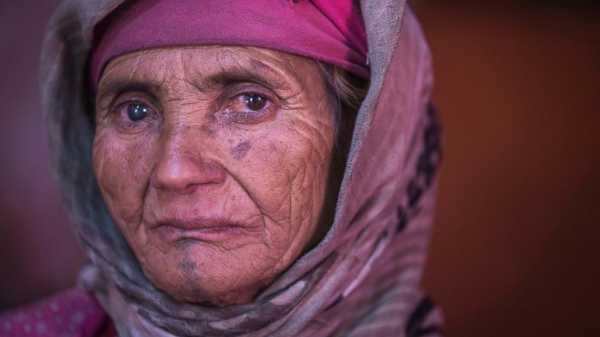
In Morocco’s Middle Atlas mountains, an ancient tradition is fading. The distinctive tribal tattoos that indigenous Amazigh women acquired in a coming of age ritual are slowly disappearing as their bearers age and die.
Strictly observant Muslims and women who want to be modern have shunned the practice, which dates to pre-Islamic times. Today, the tattoos largely are found on older Berber women who farm in rural areas.
Amazigh tattoos, whether simple or elaborate, usually consist of lines, dots, triangles and circles. Girls get their first ones during puberty; those who tolerate the pain are considered mature enough for the adult responsibilities of life in the rugged mountains.
The ink work is done for more than adornment. The imagery tells stories of tribes, ties to the land and families. The designs go on chins, cheeks and between the eyes, and extend to forearms as women mark milestones like marriage and motherhood.
“When I was 10 years old, we did (the tattoo) with a little needle. We jabbed my chin and we made a drawing,” Hadda Oaabbjdi, 72, said of her first tattoo. “This drawing is a sign that represents my village and my region, Tingaref.”
Many Amazigh women consider their “ouchem” feminine touches that set them apart from men and enhance their beauty, what 100-year-old Fadma Olla described as “a kind of makeup” she applied in her youth.
“Back then, I decorated my arms because I was wearing a Melhaf (traditional fabric), and we would pull it up so our arms could be seen. We did this when we were young; it was a sign of beauty.”
At the height of their popularity, the tattoos were seen as having the power to drive away bad spirits and bring good fortune. Some accounts said that during French colonial rule, some indigenous women believed their marked faces would make them undesirable to foreign men. However, the claim is widely disputed since the tattoos predate the colonization of Morocco.
Today, as tattoos etched decades ago grow fainter on the faces of women grown old, so, too, have they waned in social acceptance. In Morocco, wearing “ouchem” now is generally seen as outdated or worse.
Growing awareness that some branches of Islam prohibit tattoos has caused some women to try to have theirs removed. Religion is considered the key reason many parents decided against tattooing their daughters.
But many women defend the practice. Hadda Saghir, 60, offered the much-repeated though unproven claim that the Prophet Muhammad’s daughter, Fatima Al-Zahra, was inked as evidence her own tattoos couldn’t be sinful.
“They told me God would burn me in hell for these,” Saghir said, pointing to the Amazigh language symbols on her cheeks. “I belong to Him and I don’t believe that.”
“The tattoos will disappear one day,” she added. “But until then, we remain loyal to our traditions.”
Sourse: abcnews.go.com
0.00 (0%) 0 votes


































